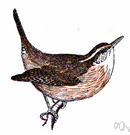However, the only significant relationship was in the occupancy of
Carolina wren, which was positively related to the variable.
Coefficients for four species (
Carolina wren, northern cardinal, song sparrow, American goldfinch) were greater for all shrubland, versus just upland shrubland.
Three species differentiated Sweet William from the other forests: Carolina Chickadee,
Carolina Wren, and Kentucky Warbler.
The most dominant species were the
Carolina Wren (D=5.28 birds/ha; A=173 inds.; FO=62.2%) and Golden-fronted Woodpecker (D=5.19 birds/ha; A= 198 inds.; FO=57.9%) as permanent residents, and Summer Tanager (D=6.36 birds/ha; A=167 inds.; FO=50.2%), as a summer breeder.
For the nonalcohol crowd, there are the Eastern towhee, who tells us Drink your tea; the
Carolina wren, who loudly sings teakettle, teakettle, teakettle; and the song sparrow, whose complex song Richard Walton describes as Maids maids maids pick up the tea kettle kettle kettle.
People sometimes remember a bird's song better by making up words for what the bird "says." For example, a
Carolina wren often sings something that sounds like teakettle, teakettle, tea.
Imagine a
Carolina wren and a red-tailed hawk flying over your neighborhood.
For now it has stopped and the air is pierced by the deep-throated call of a
Carolina wren.
The classics tell her that, among other things, the syrinx is not merely the vocal organ that allows a
Carolina wren to sing two different songs at once.
This Road Since Freedom (
Carolina Wren Press, $17.50), a collection of poems (some dating back to the 1940s) written by noted scholar C.
Joe Suchecki, bird monitor for Naperville's Springbrook Prairie Forest Preserve since 1994, added four birds to the site list:
Carolina wren, Brewer's sparrow, whip-poor-will and willet.
We've already seen several southern species like the
Carolina wren, tit-mouse, cardinal, red-bellied woodpecker, and mockingbird move into New England.
 Carolina wren - large United States wren with a musical call
Carolina wren - large United States wren with a musical call